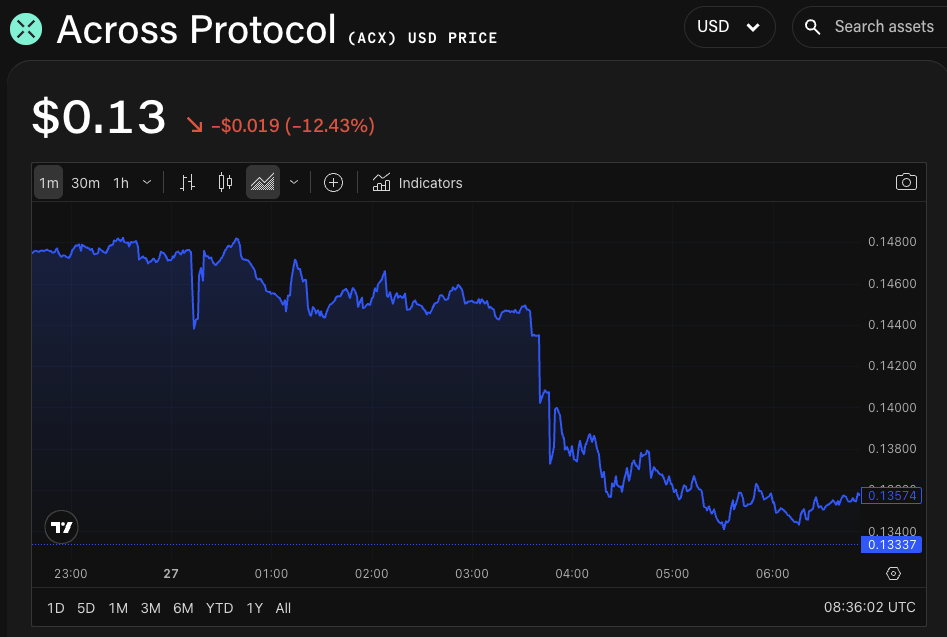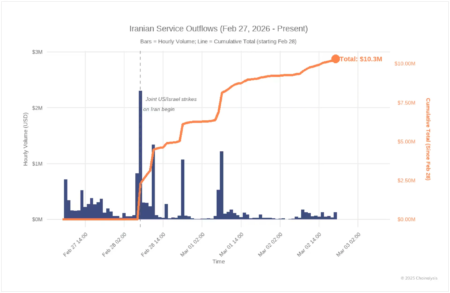ACX Token Faces Severe Drop Amid Allegations of Mismanagement and Insider Trading
The ACX token recently suffered a significant decline of over 10%, fueled by serious allegations against the Across Protocol team. Claims have emerged asserting that the team misused DAO governance to funnel substantial funds to their private company, raising concerns about ethical practices in the cryptocurrency landscape. Notably, ACX was trading at approximately $0.151 before the allegations broke, plummeting to a low of $0.134, marking a 12.5% drop in just 24 hours and a staggering 41% decrease over the past month.
Allegations and Accusations: Who’s Behind the Claims?
The initial allegations were brought to light by Ogle, the pseudonymous founder of the modular crypto infrastructure platform Glue. He asserted that the Across Protocol team, which operates as a DAO-based cross-chain bridge backed by Risk Labs, misappropriated around $23 million worth of ACX tokens from the community treasury for their benefit. According to Ogle, certain proposals that seemingly had community backing were pushed through using insider-controlled wallets linked to key figures in the team, including Risk Labs CEO Hart Lambur and Treasurer Kevin Chan. Ogle’s claims highlighted a concerning trend wherein DAOs, allegedly designed for decentralized governance, may actually be subject to manipulation by insiders.
Ethical Concerns and Transparency Issues in DAO Governance
These allegations prompted a broader critique of decentralized autonomous organizations (DAOs), with Ogle expressing doubts about their actual decentralization. He claimed that the lack of transparency and governance ethics deteriorates trust in cryptocurrencies overall, even if no legal infractions occurred. "Many DAOs are decentralized in name only," Ogle stated, underscoring that insiders often benefit from steering governance processes for personal gain. His assertions raised the alarm about the fragility of trust within the crypto ecosystem, especially considering how financial transactions and allocations are supposed to be transparent and equitable.
Response from Across Protocol: A Defense Against Allegations
In a vehement rebuttal, Hart Lambur categorically denied all accusations and emphasized the integrity of the Across Protocol team. He described the allegations as "categorically untrue" and stated that the team has not extracted value from the DAO. Lambur reiterated that Risk Labs operates as a nonprofit with no shareholders, and the funds in question were utilized for legitimate purposes, such as enhancing the Across protocol. He noted that he, along with his team, has been committed to maintaining ethical practices in the crypto space for six years.
Insider Trading Claims and the Binance Listing Controversy
The situation worsened when Lambur found himself embroiled in a public dispute with Bryan Pellegrino, the founder of LayerZero. Pellegrino accused Lambur of insider trading, alleging that he purchased ACX tokens just before they were listed on Binance. Lambur firmly denied these claims, stating that he had no prior knowledge of the listing. He stressed that his purchases were made publicly to support the project, and he remains an active holder of those tokens. He expressed disappointment at Pellegrino’s accusations, characterizing them as part of a competitive smear campaign lacking any substantiating evidence.
The Fallout: Market Reaction and Future Implications
The fallout from these allegations has had an immediate impact on the market, raising questions about the sustainability of ACX’s value and the management practices of DAOs in general. As the crypto community scrutinizes the governance frameworks of various projects, the ACX incident serves as a cautionary tale about the importance of transparency and ethical behavior. Investors and stakeholders are keenly watching how the Across Protocol addresses these allegations and whether it can restore trust among its community.
Conclusion: Navigating Challenges in the Crypto Space
As the cryptocurrency market continues to rapidly evolve, incidents like the ACX controversy emphasize the critical need for strong governance models and ethical frameworks within DAOs. Stakeholders must prioritize transparency and accountability to build trust and ensure long-term success. The ongoing situation between Across Protocol and its critics will undoubtedly influence perceptions of governance integrity in crypto, reminding all involved in the sector of the challenging yet necessary balance between innovation and ethical responsibility.
In the dynamic landscape of cryptocurrencies, maintaining trust is vital. The ACX case highlights ongoing debates about governance practices in DAOs and the necessity for robust safeguards against mismanagement. Moving forward, it will be crucial for crypto projects to cultivate a culture of integrity and transparency to foster trust and engagement in an industry that thrives on decentralized principles.
















